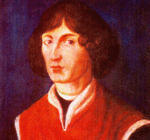Nicolaus Copernicus
Copernicus worked for years on his book describing his theory, and published it near the very end of his life. He entitled it, "De revolutionibus orbium coelestium" ("On the Revolutions of the Heavenly Spheres"), and published it in 1543. The major parts of Copernican theory are:
- Heavenly motions are uniform, eternal, and circular or compounded of several circles (epicycles).
- The center of the universe is near the Sun.
- Around the Sun, in order, are Mercury, Venus, Earth and Moon, Mars, Jupiter, Saturn, and the fixed stars.
- The Earth has three motions: daily rotation, annual revolution, and annual tilting of its axis.
- Retrograde motion of the planets is explained by the Earth's motion.
- The distance from the Earth to the sun is small compared to the distance to the stars.
The reception to his work was initially positive within the Catholic Church (contrary to popular belief, Galileo was not persecuted for supporting the Copernican theory, but because he was disrespectful to the Pope). However, the reaction was negative among Protestants who felt it conflicted with some literal interpretations of the Bible, such as the account of how Joshua benefited from the sun standing still as it passed over the earth. "And the sun stood still, and the moon stayed, until the people had avenged themselves upon their enemies. Is not this written in the book of Jasher? So the sun stood still in the midst of heaven, and hasted not to go down about a whole day." Joshua 10:13. But there were few Protestants in Poland then (or now), and Copernicus died without much controversy.
Copernican Revolution
Copernicus's book title used the word "revolution" in the sense of planets revolving around the Sun, not in the sense of an intellectual revolt. In the late 20th century, the term Copernican Revolution has come to mean the prototypical [paradigm shift], where scientists suddenly became enlightened by rejecting the prejudices of their predecessors.
In fact the Copernican theory was no more accurate than the Ptolemaic model. It had no compelling physical arguments for its superiority, and it proposed no experiments for testing its novel features. Some people claim that it was aesthetically superior because it eliminated epicycles, but it actually had about the same number of epicycles as the Ptolemaic model. Of course, later scientists such as Tycho Brahe solved these problems.
Copernican Principle
The Copernican Principle says that Man has no special place in the universe. According to some, this principle has an almost Biblical significance. For example, Encyclopedia Britannica says:
- The implications of Copernicus' work can not be exaggerated. His views challenged the literal interpretation of Scripture, the philosophical and metaphysical foundations of moral theory, and even common sense itself. The result was a massive opposition to his reported ideas. It was the slow, sure acceptance of the heliocentric theory by natural philosophers that ultimately quieted the general clamor, however the name of Copernicus is still a battle cry against the establishment in religion, philosophy and science. In later years with Freud, man lost his Godlike mind; with Darwin his exalted place among the creatures of the Earth; with Copernicus man had lost his privileged position in the Universe.[1]
All of this would have been unrecognizable to Copernicus. His model was readily accepted to the extent that it agreed with observation, and abandoned when better models came along later. He didn't challenge any moral theory, and he got Catholic Church approval for his book. Not everyone views the history of science as the story of how Man became insignificant.

